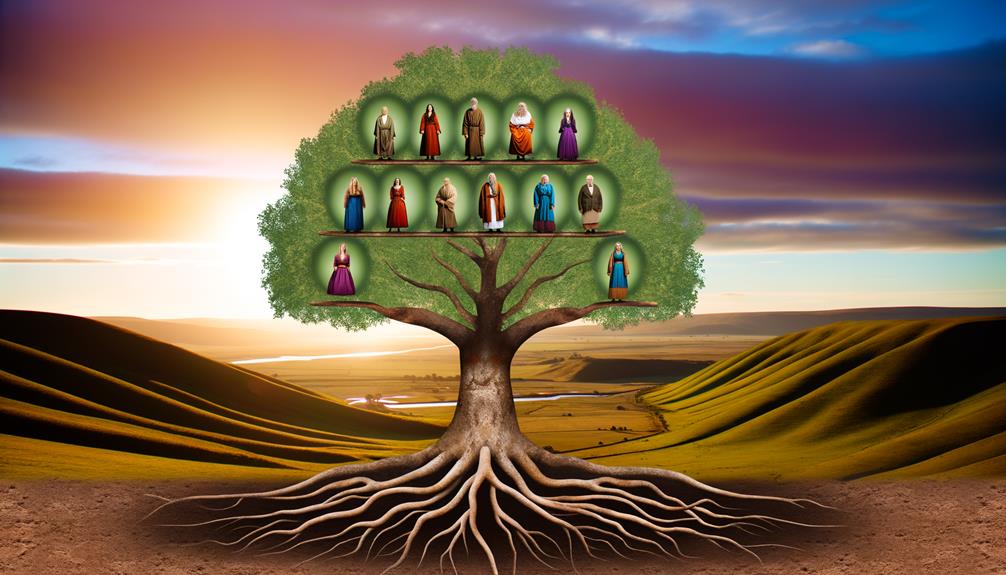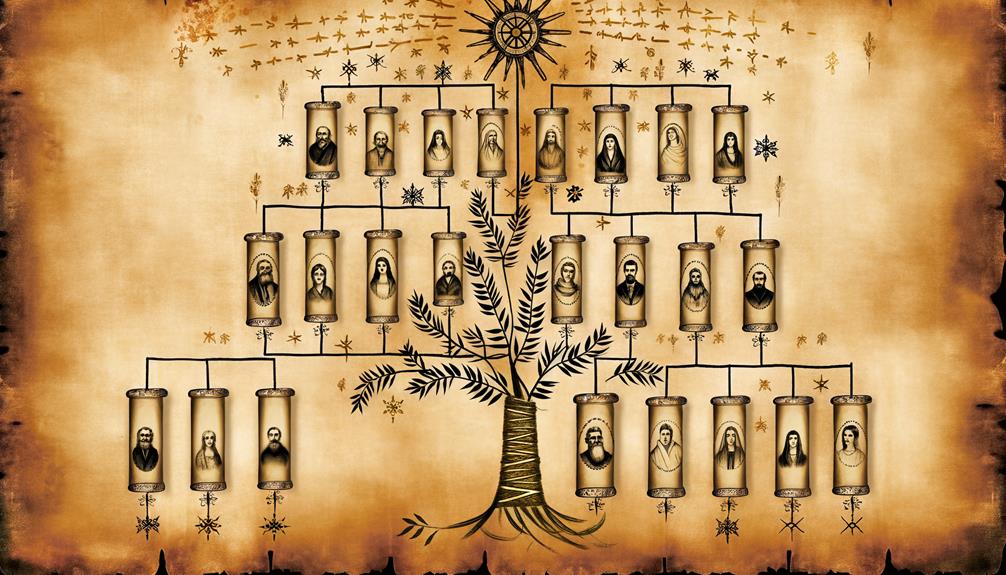Beget Meaning In The Bible: Lineage and Legacy
In the Bible, ‘beget‘ refers to the act of fathering or generating offspring, emphasizing lineage and the transmission of identity, divine blessings, and covenantal promises across generations. The term is central to biblical genealogies, illustrating God’s ongoing relationship with humanity and the fulfillment of divine promises.
In the Old Scripture, genealogical records root key figures within God’s redemptive history. The New Scripture uses ‘beget’ to affirm Jesus’s messianic lineage and divine sonship.
This concept underscores the continuity of God’s covenant and the spiritual and ethical teachings passed down through generations, revealing deeper layers of divine intent and historical significance.

Beget Meaning in the Bible: Lineage, Legacy, and Divine Purpose
| Biblical Reference | Usage Context | Spiritual Meaning |
|---|---|---|
| Genesis 5:3 | Adam begets Seth | Continuation of life and divine lineage |
| Matthew 1:2-16 | Genealogy of Jesus | Fulfillment of prophecy and God’s plan through generations |
| John 3:16 | Only begotten Son | Divine uniqueness and eternal relationship |
| Hebrews 1:5 | God begets His Son | Declaration of divine sonship and authority |
| Psalm 2:7 | You are my Son, today I have begotten you | Symbol of divine kingship and Messianic prophecy |
Definition of Beget

In biblical terminology, ‘beget‘ refers to the act of fathering or generating offspring, often underscoring a lineage or genealogical significance within the scriptural context.
This term is pivotal in understanding the ancestral records presented in the Bible, particularly in the genealogies that trace the lineage of significant figures, such as Adam, Abraham, and David.
The use of ‘beget’ serves not only as a biological term but also as a theological construct, emphasizing divine purpose and covenantal promises.
The concept encapsulates the transmission of identity, heritage, and divine blessing through successive generations.
Consequently, ‘beget’ provides a foundational framework for interpreting familial and tribal structures as they relate to God’s unfolding plan within biblical narratives.
Beget in Old Testament

The Old Scripture extensively employs the term ‘beget‘ to chronicle the genealogies of key patriarchal figures, thereby establishing a narrative continuity that underscores the fulfillment of divine covenants.
This term, often rendered from the Hebrew verb ‘yalad,’ signifies the biological act of fathering children, yet it carries profound theological implications.
By documenting who begat whom, the Old Testament not only preserves historical lineage but also conveys the transmission of divine promises and blessings through generations.
For instance, the genealogies in Genesis meticulously trace the lineage from Adam through Noah to Abraham, highlighting the perpetuation of God’s covenantal relationship with humanity.
Consequently, ‘beget’ functions as a pivotal motif, illustrating God’s enduring faithfulness and sovereign orchestration of history.
Genealogies and Lineage

The genealogies presented in the Bible serve not only as historical records but also as theological constructs that underscore the continuity of God’s covenant through successive generations.
These biblical family trees emphasize the ancestral significance by tracing lineage from pivotal figures like Adam, Abraham, and David, thereby contextualizing individual roles within the broader narrative of divine promise and fulfillment.
Understanding these genealogical accounts is essential for comprehending the intricate tapestry of relational and covenantal dynamics in biblical theology.
Biblical Family Trees
Genealogies and lineage in the Bible serve as foundational elements that trace the descent of key figures, revealing the intricate web of familial relationships and divine promises throughout biblical history.
These genealogies are more than mere historical records; they function as theological constructs that underscore God’s covenantal faithfulness and the unfolding of His redemptive plan.
For instance, the genealogies in Genesis establish connections between Adam, Noah, Abraham, and ultimately, the nation of Israel.
Similarly, the genealogical records in the Gospels of Matthew and Luke trace the lineage of Jesus Christ, affirming His messianic credentials and fulfilling Old Covenant prophecies.
Consequently, biblical family trees illuminate the interconnectedness of divine purpose and human history, reinforcing the continuity of God’s salvific narrative.
Ancestral Significance Explained
Examining the ancestral significance of genealogies and lineage in the Bible reveals deeper theological insights into how these records underscore the fulfillment of divine promises and the continuity of God’s redemptive plan.
Genealogies serve as more than mere historical accounts; they establish the legitimacy of key figures in salvation history, such as Jesus Christ, by linking them to pivotal covenantal figures like Abraham and David. This connection affirms God’s faithfulness across generations, highlighting His sovereign orchestration through human history.
In addition, these lineages emphasize the inclusivity of God’s plan, integrating diverse individuals and nations into the narrative of redemption.
Consequently, biblical genealogies are foundational to understanding the unfolding of divine salvation and the intricate tapestry of God’s covenantal relationships.
Beget and Covenant

Understanding the interplay between the concept of ‘beget’ and the covenantal framework within the Bible reveals profound theological insights. The act of begetting in biblical narratives is not merely biological but deeply spiritual, intertwined with God’s promises and human responsibilities.
This union underscores the continuity of divine blessings and mandates across generations.
- Divine Promise: Begetting often signifies the fulfillment of God’s promises, such as Abraham’s descendants.
- Covenantal Lineage: It guarantees the preservation of the covenant through successive generations.
- Inheritance of Blessings: Offspring inherit both spiritual and material blessings, strengthening covenantal bonds.
- Obligations: Each generation carries the covenantal duties, maintaining their relationship with God.
- Messianic Prophecy: The genealogy of Jesus highlights the ultimate fulfillment of God’s covenant through begetting.
This nuanced understanding enriches our grasp of biblical theology.
Cultural Context of Begetting

The cultural context of begetting in biblical times reveals the intricate relationship between ancient familial structures and their genealogical significance.
This practice was not merely biological but served to establish and perpetuate social, legal, and theological identities within the community.
Understanding these dynamics is essential to comprehending the broader implications of begetting as presented in the biblical narrative.
Ancient Familial Structures
In ancient familial structures, the concept of begetting was intrinsically tied to notions of lineage, inheritance, and social status within the cultural and theological framework of biblical societies.
This practice held profound significance as it guaranteed the continuity of family lines and the preservation of property and social standing. The act of begetting was not merely biological but carried substantial communal and spiritual implications.
- Lineage: Guaranteeing the continuation of a family name and heritage.
- Inheritance: Legal and social systems were based on inherited property.
- Social Status: Family connections determined one’s place within the community.
- Spiritual Significance: Seen as fulfilling divine purposes and covenants.
- Cultural Identity: Family lineage contributed to one’s identity within the broader society.
Understanding these elements provides a deeper insight into the biblical text.
Genealogical Significance Explored
Examining the genealogical significance within the cultural context of begetting reveals how these practices underscored not only familial continuity but also the broader theological and societal frameworks in biblical times.
Genealogies in the Bible served as essential records, reinforcing divine promises and covenants through specific lineages. They provided legitimacy to claims of inheritance, leadership, and priesthood, rooting individuals within the sacred history of Israel.
Additionally, begetting highlighted the fulfillment of God’s promises, such as the Davidic line leading to the Messiah.
Understanding these genealogies offers deeper insight into the biblical narrative, illustrating how the act of begetting was crucial not just for family lineage but for conveying theological truths and societal structures integral to ancient Israelite identity.
Divine Plans and Promises

Exploring divine plans and promises reveals the profound ways in which biblical narratives articulate God’s intentions and commitments to humanity. These promises are not merely historical artifacts but theological declarations that underscore the nature of divine-human interaction.
Through covenantal frameworks, God’s plans are seen as both immediate and eschatological, encompassing temporal and eternal perspectives.
- Covenant with Abraham: Promises of land, descendants, and blessing (Genesis 12:1-3).
- Davidic Covenant: Assurance of an everlasting kingdom through David’s lineage (2 Samuel 7:12-16).
- New Covenant: Foretold in Jeremiah, emphasizing heart transformation and forgiveness (Jeremiah 31:31-34).
- Messianic Prophecies: Predictions of a savior to fulfill divine plans (Isaiah 53).
Beget in New Testament

Frequently, the term ‘beget’ in the New Scriptures conveys profound theological significance, particularly in relation to the genealogy and divine sonship of Jesus Christ. This term is pivotal in establishing the Messianic lineage and the unique nature of Jesus as the Son of God. This understanding is further reinforced by references to the ‘begotten son definition in scripture,’ emphasizing the unique relationship between Jesus and the Father. The term not only highlights His divine origin but also His role as the one through whom believers are invited into a relationship with God. By affirming Jesus as the only begotten Son, the scriptures underscore the depth of His mission and the significance of His sacrifice for humanity.
The New Covenant uses ‘beget’ to bridge Old Covenant prophecies with the fulfillment found in Christ, underscoring His dual identity as both human and divine.
| Scriptural Reference | Significance |
|---|---|
| Matthew 1:1-16 | Genealogical lineage of Jesus |
| Luke 3:23-38 | Ancestral heritage of Christ |
| John 1:14 | Divine incarnation of the Word |
| Hebrews 1:5 | Jesus as the begotten Son of God |
Through these references, ‘beget’ encapsulates the theological essence of Christ’s origin and mission.
Symbolic Interpretations

The theological significance of ‘beget’ extends beyond literal genealogies to encompass rich symbolic interpretations that deepen our understanding of divine relationships and spiritual heritage.
- Divine Creation: Symbolizes God’s creative power in bringing forth life and order.
- Spiritual Adoption: Reflects the concept of believers being ‘born again’ into God’s family.
- Covenantal Lineage: Represents the continuation of God’s promises through successive generations.
- Christological Significance: Jesus as the ‘only begotten’ underscores His unique divine sonship and mission.
- Moral and Ethical Transmission: Highlights the passing down of spiritual virtues and ethical teachings across generations.
These symbolic interpretations offer a profound lens through which to view the intricate tapestry of divine-human interactions, enriching the theological landscape.
Theological Implications

In examining the theological implications of the term ‘beget’, one uncovers profound insights into the nature of divine filiation, the transmission of covenantal promises, and the perpetuation of spiritual and ethical legacies within the biblical narrative.
The concept of begetting highlights the intimate relationship between God and humanity, emphasizing the divine initiative in creating and sustaining life.
Moreover, it reflects the continuity of God’s covenant with His chosen people, as seen in the genealogies that trace the lineage from Adam to Christ.
This perpetuation of a sacred lineage underscores the importance of faithfulness and obedience to divine commandments, ensuring that spiritual and ethical teachings are preserved and transmitted through successive generations, thereby shaping the collective identity of the faith community.
Conclusion
The term ‘beget‘ in the Bible encapsulates more than mere biological reproduction; it signifies a divine orchestration of lineage and covenant.
Like a master weaver intertwining threads into a grand tapestry, the act of begetting binds together genealogical records, covenantal promises, and divine plans.
This intricate weave underscores not only the continuity of God’s covenant but also the unfolding of divine purpose through human history, offering a profound theological reflection on the interconnectedness of life, faith, and divine intention.






